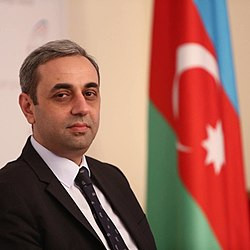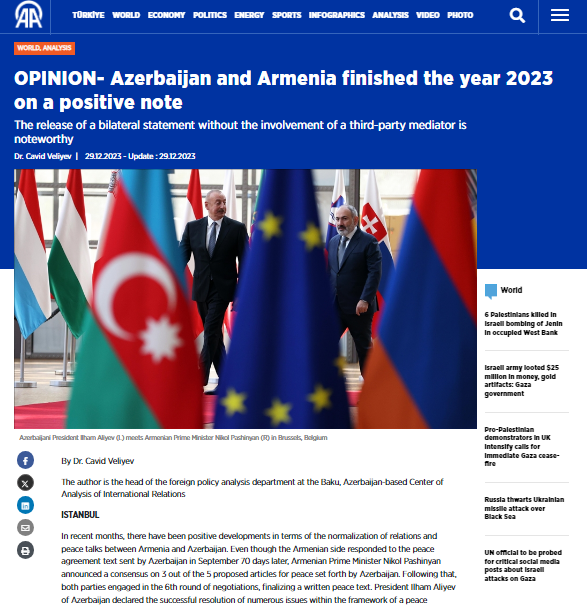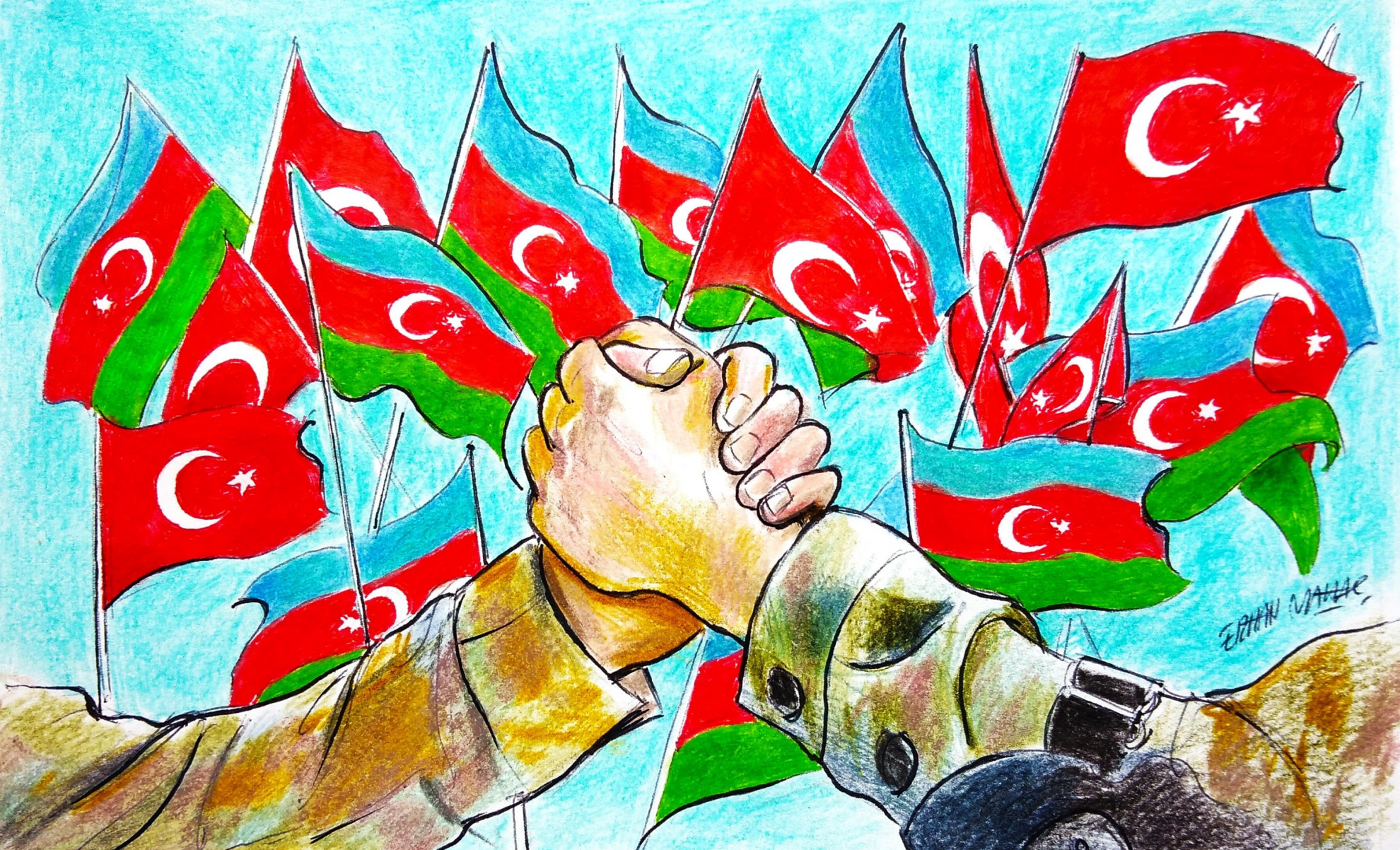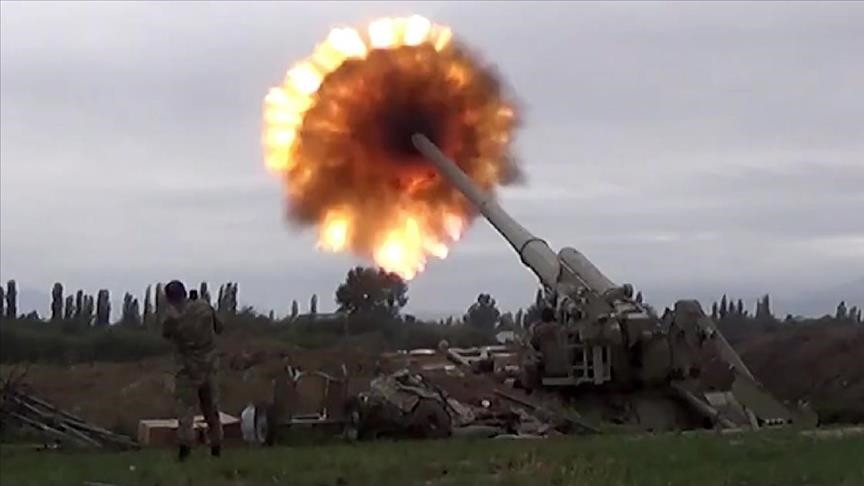ISTANBUL
In recent months, there have been positive developments in terms of the normalization of relations and peace talks between Armenia and Azerbaijan. Even though the Armenian side responded to the peace agreement text sent by Azerbaijan in September 70 days later, Armenian Prime Minister Nikol Pashinyan announced a consensus on 3 out of the 5 proposed articles for peace set forth by Azerbaijan. Following that, both parties engaged in the 6th round of negotiations, finalizing a written peace text. President Ilham Aliyev of Azerbaijan declared the successful resolution of numerous issues within the framework of a peace agreement. Simultaneously, Azerbaijan's Foreign Minister Ceyhun Bayramov revealed hopeful developments stated in Armenia's latest proposal.
The Delimitation and Demarcation Commission, which has been involved in bilateral discussions, has made significant progress. Subsequently, the governments of both countries gave their consent, approving the date, time, and the location for the convening of the Delimitation of State Border and Border Security commissions between the Republic of Armenia and the Republic of Azerbaijan.
Joint statement
Remarkably, on December 7, a joint statement was unexpectedly released by the Presidential Administration of the Republic of Azerbaijan and the Office of the Prime Minister of the Republic of Armenia. The nature of this statement, resembling a collaborative declaration between long-term partners rather than adversaries entrenched in a 30-year conflict, surprised many experts. Notably, the joint statement was issued ahead of a formal peace agreement, signaling a significant step towards resolution.
According to this statement, the two countries express a shared commitment to normalize relations and reach a peace agreement. Based on the principles of sovereignty and territorial integrity Azerbaijan releases 32 Armenian soldiers, and Armenia releases 2 Azerbaijani soldiers; Armenia withdraws its candidacy for hosting the 29th Conference of the Parties (COP29) to the UN Framework Convention on Climate Change; Armenia and Azerbaijan express optimism that other countries within the Eastern European Group will join in supporting Azerbaijan's offer to host COP29; The Republic of Azerbaijan supports Armenia's candidacy for membership of the COP Bureau of the Eastern European Group.
This joint statement holds significant importance in shaping a positive agenda towards a peace agreement between the two countries. There are several reasons for this. Firstly, the release of a bilateral statement without the involvement of a third-party mediator is noteworthy. Notably, Armenia, which had previously advocated for a mediator's presence, and Azerbaijan's preference for direct bilateral resolution shows an impressive determination to addressing issues independently. Secondly, the decision by Armenia to withdraw from hosting an international meeting in favor of Azerbaijan, coupled with Azerbaijan's support for Armenia's candidacy, represents a pivotal confidence-building measure. Third, the significance of this joint statement comes from a sense of mutual goodwill and political commitment rather than external pressure. In summary, these three pivotal aspects—direct bilateral engagement, reciprocal support on the international stage, and the absence of external pressure—significantly contribute to creating a positive environment for further peace process between Armenia and Azerbaijan.
Factors contributing to the change of dynamics
The joint statement, the first since the two republics gained independence, was also welcomed by Türkiye, the US, the EU, Russia and many international players. During his visit to Azerbaijan, Turkish Foreign Minister Hakan Fidan stated that Ankara supports the process of normalization of relations between Armenia and Azerbaijan.
Certainly, the joint statement signifies a notable shift in the diplomatic dynamics, and one of the significant factors contributing to this change is the altered military landscape in the aftermath of anti-terrorism measures taken by the Azerbaijani army on September 19 against the Armenian armed forces in Karabakh. The military developments compelled the surrender of armed groups, diminishing Armenia's leverage in diplomatic negotiations. The actions taken by the Azerbaijani army not only resulted in the surrender of armed entities but also necessitated the dissolution of illegal structures in the region. This strategic development effectively limited Armenia's ability to wield illegal armed forces in the region as a diplomatic tool against Azerbaijan.
Furthermore, Armenia submitted a comprehensive 10-article request against Azerbaijan to the International Court of Justice (ICJ). The ICJ's deliberation resulted in the rejection of 7 of these demands, while affirming Azerbaijan's sovereignty in the remaining 3 articles. Notably, over the course of the past year, the ICJ issued 3 decisions in response to Armenia's complaints, and in all instances, the decisions favored Azerbaijan. As a result, Armenia has suffered an enormous setback, losing important diplomatic influence because the ICJ decisions did not support its requests.
The third factor leading to the signing of the joint statement stems from the outcomes of Armenia's previous aim to exploit the EU and US assistance to exert pressure on Azerbaijan. For a while, Armenia was successful in this. Without Azerbaijan's participation, the EU accepted the Granada Statement, and the US deputy secretary of state threatened Azerbaijan before members of the US Congress. However, this could end up resulting in the West losing Azerbaijan, the peace talks being halted, and the West losing its role as a neutral mediator in this process. Losing Azerbaijan is an undesirable conclusion for the West, which aims to strengthen its ties with Central Asia by avoiding Russia and Iran in the region. Azerbaijan was also an alternate energy source for Europe. As a result, Armenia was forced to take action against Azerbaijan, giving up its third advantage in diplomatic negotiations.
The joint statement made on December 7 does generate a positive state between the two sides for the first time. This might accelerate the process of establishing trust between the parties, normalization, and, finally, the signing of a peace agreement. There is already a document on which the two parties have mutually negotiated and reached an agreement in principle.
The positive atmosphere developed between countries can provide new hope to the Zengezur corridor's realization. In one of his latest speeches President Aliyev stated that, Azerbaijan does not have any reservations with respect to Armenian sovereignty; however, the notion of seamless passage from Azerbaijan to Nakhchivan entails a commitment not to impose customs taxes, inspections, or border security. President Aliyev has shown that Azerbaijan has hope for the Zengezur corridor. On the other hand, with the completion of the road via Iran, the Armenian side became concerned that they would be cut off from future regional projects. The possibility of Armenia becoming isolated from the region, as well as Azerbaijan's expectations, suggest that Zengezur is still on the agenda.
Of course, disagreements between Armenia and Azerbaijan still remain. Despite Armenia's acceptance of 3 out of the 5 articles proposed by Azerbaijan, a formal statement regarding the remaining 2 is yet to be made. This delay can be linked to internal factions within Armenia resistant to the idea of normalization with Azerbaijan.
The December 7 statement showed that the parties could resolve issues at a bilateral level and cooperate without a peace agreement. For this reason, such collaborations can be made to establish a positive atmosphere that will also serve the signing of the peace agreement in 2024.








